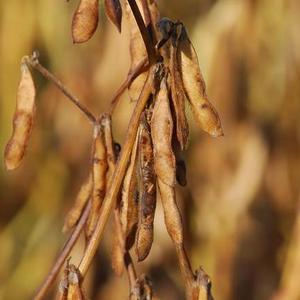Futures plunge as China retaliates with tariffs on US soybeans

April 4, 2018
BY Ron Kotrba
The escalating trade war between the U.S. and China is already taking its toll on America’s soybean farmers, as soybean futures dropped nearly 40 cents a bushel on the morning of April 4 following China’s announcement of a 25 percent tariff on imported U.S. soybeans. “At a projected 2018 crop of 4.3 billion bushels, soybean farmers lost $1.72 billion in value for our crop this morning alone,” said John Heisdorffer, president of the American Soybean Association. “That’s real money lost for farmers, and it is entirely preventable.”
In January, the U.S. imposed hefty tariffs on solar panels, most of which come from China. In March, the U.S. put tariffs on imported steel and aluminum. On April 2, China retaliated with its own tariffs on 128 U.S. products, including ethanol, pork, steel pipes and wine, to name a few. The following day, the U.S. proposed a 25 percent tax on 1,300 more Chinese goods, including aerospace and medical equipment. On April 4, China announced a similar 25 percent levy on more U.S. goods, from automobiles to soybeans.
China is the largest customer of U.S. soybeans, purchasing 61 percent of total U.S. soybean exports and more than 30 percent of overall U.S. soybean production, according to the ASA.
Advertisement
Advertisement
Minnesota alone exports more than $2 billion in soybeans annually, with China as the state’s top export market.
“In a down farm economy, with farm income down 50 percent from 2013, this could have a devastating impact on Minnesota’s 28,000 soybean farmers,” said Michael Petefish, president of the Minnesota Soybean Growers Association. “The last thing the administration should be doing is starting a trade war on the backs of American farmers.”
Advertisement
Advertisement
The ASA and state soybean groups are calling on the White House to reconsider the tariffs that brought all this about.
“We still have not heard a response from the administration to our March 12 letter requesting to meet with President Trump and discuss how the administration can work with soybean farmers and others in agriculture to find ways to reduce our trade deficit by increasing competitiveness rather than erecting barriers to foreign markets,” Heisdorffer said. “It should surprise no one that China immediately retaliated against our most important exports, including soybeans. We have been warning the administration and members of Congress that this would happen since the prospect for tariffs was raised. That unfortunately doesn’t lend any comfort to the hundreds of thousands of soybean farmers who will be affected by these tariffs. This is no longer a hypothetical, and a 25 percent tariff on U.S. soybeans into China will have a devastating effect on every soybean farmer in America.”
Heisdorffer said there is still time to reverse the damage. “China has said that its 25 percent tariff will only go into effect based on the course of action the administration takes,” he said. “We call on President Trump to engage the Chinese in a constructive manner—not a punitive one—and achieve a positive result for soybean farmers.”
Related Stories
CountryMark on July 22 celebrated the completion of more than $100 million in upgrades at its refinery in Indiana, including those related to soybean oil storage. The facility produces renewable diesel via coprocessing technology.
ATOBA Energy and Air Moana are partnering to implement scalable solutions for the supply of SAF. The collaboration aims to ensure long-term SAF availability while supporting local initiatives to develop sustainable fuel production in Tahiti.
While final IRS guidance is still pending, the foundation of the 45Z program is well defined. Clean fuel producers should no longer be waiting; they can now move forward with critical planning and preparation, according to EcoEngineers.
Neste Corp. on July 24 released second quarter results, reporting record quarterly renewable product sales volumes despite weaker margins. SAF sales were up nearly 80% when compared to the first quarter of 2025.
Valero Energy Corp. on July 24 released second quarter results, reporting a profitable three-month period for its ethanol segment. The renewable diesel segment posted a loss, but the company’s new sustainable aviation fuel (SAF) unit operated well.
Upcoming Events










